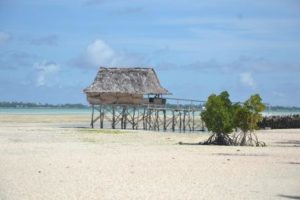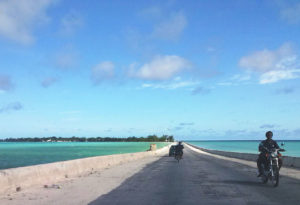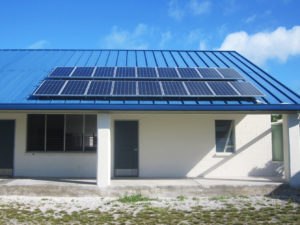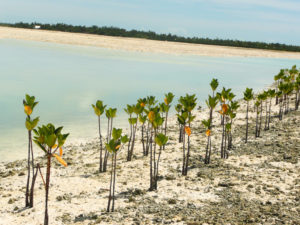SPC/GIZ Coping with Climate Change in the Pacific Islands Region (CCCPIR) programme
In response to Kiribati’s request for support in addressing climate change and in  line with SPC’s Climate Change Engagement Strategy, the SPC/GIZ Coping with Climate Change in the Pacific Island Region (CCCPIR) project is proactively supporting SPC’s ‘one-team’ approach to climate change jointly with the EU SPC Global Climate Change Alliance (GCCA), the United States Agency for International Development (USAID) Vegetation and Land Cover Mapping and Improving Food Security projects and the Australian Agency for International Development (AusAID) International Climate Change Adaptation Initiative (ICCAI).
line with SPC’s Climate Change Engagement Strategy, the SPC/GIZ Coping with Climate Change in the Pacific Island Region (CCCPIR) project is proactively supporting SPC’s ‘one-team’ approach to climate change jointly with the EU SPC Global Climate Change Alliance (GCCA), the United States Agency for International Development (USAID) Vegetation and Land Cover Mapping and Improving Food Security projects and the Australian Agency for International Development (AusAID) International Climate Change Adaptation Initiative (ICCAI).
CCCPIR is also collaborating with the Secretariat of the Regional Environment Programme (SPREP)/USAID Climate Change Program. The national focal point is the Office of te Beretitenti.
Climate change is forecast to have substantial impacts on Kiribati’s coastal and oceanic fisheries, their habitats and reefs, livestock and crop production and the little land available to I-Kiribati. Together, increasing population and climate change are expected to place greater pressure on natural resources including inshore and lagoon fisheries and marine animal life associated with the coral reefs as well as livestock and crops that are grown on atolls. Especially on outer islands, I-Kiribati communities depend on subsistence fishing and farming for their food security, whilst in South Tarawa the population growth is leading to a need for economic growth and high pressure on natural resources, waste management, and sanitation, with associated health impacts.
After the endorsement of the National Climate Change Adaptation Framework (NCCAF 2013), the Government of Kiribati aims to develop the Kiribati Joint Implementation Plan on Climate Change and Disaster Risk Management (KJIP) to agree across line ministries and non-state actors on priority actions to increase the country’s resilience in the face of climate change and reduce disaster risks at national, sector and community level. Coordination, monitoring and communication on climate change need strengthening.
Achievements since 2011:
- With the SPC one-team approach on climate change coordination is enhanced both at regional and country level and a broad range of sectors benefit from the programmes. Synergies and integrated approaches are enabled. CCCPIR’s focuses on the education, energy, fisheries and livestock sectors. Other SPC climate change programmes focus on agriculture and livestock, coastal zones, health and water (and the focus of the SPREP/USAID project is on water).
- The Kiribati National Expert Group that is currently developing KJIP enables enhanced coordination of climate change programmes (supported by a regional team lead by SPREP, with SPC, the United Nations Development Program [UNDP], the United Nations Children's Fund [UNICEF] and the Pacific Australia Climate Change Science and Adaptation Planning programme and GIZ).
- Government officials of various line ministries such as the Ministry of Fisheries and Marine Resource Development; the Ministry of Environment, Lands and Agriculture Development; the Ministry of Public Works and Utilities; and the Ministry of Health and Medical Services have been trained on how to use cost–benefit analysis (CBA) tools in projects that are effected by climate change (January 2013, in collaboration with SPREP). As a result of this training CBA plans were developed, for example, for nationwide deployment of fish aggregating devices to increase food security, and for renewable energy options on Kiritimati Island.
- Climate change is one the five key objectives of the draft Kiribati National Fisheries Policy and figures prominently across its priority actions (this is also as a result of AusAID and SPC climate change programmes’ assistance). Fisheries officers have been trained on CBA and on the conclusions and recommendations of the book Vulnerabilities of Tropical Pacific Fisheries to Climate Change and Aquaculture published by SPC in 2011.
Activities in 2013:
- Finalisation of KJIP (literature review, development of action matrix, costing, development of monitoring and evaluation framework, facilitation of national level consultations and potentially community consultations, jointly with Regional Support Team).
- Further support to the Ministry of Fisheries and Marine Resource Development on mainstreaming climate change considerations.
- Finalisation of a concept note on sustainable livestock production systems with the Ministry of Environment, Lands and Agriculture Development through national consultations (jointly with SPC/USAID).
- Economic and financial analysis and development of a project proposal for renewable energy and energy efficiency on Kiritimati Island with the Ministry of Public Works and Utilities (further project proposal development).
As requested by the Government of Kiribati, SPC and SPREP climate change programmes will jointly implement climate change adaptation and mitigation measures with an integrated multi-sector ‘whole of island’ approach on one or two outer islands.
programmes will jointly implement climate change adaptation and mitigation measures with an integrated multi-sector ‘whole of island’ approach on one or two outer islands.
Key achievements:
CCCPIR, jointly with other SPC climate change programmes, supported the Office of te Beretitenti to initiate a process to develop and agree on criteria for the selection of vulnerable outer islands as implementation sites with a multi-sector working group.
Activities in 2013:
- Development of an integrated vulnerability assessment and action planning approach with the Government of Kiribati, SPC and SPREP climate change programmes.
- Outer island consultation, participatory vulnerability assessment and action planning for sustainable development and implementation of identified adaptation and mitigation actions targeting coastal fisheries, energy, livestock, education and other sectors to support the joint Kiribati Whole of Island Climate Change Programme.
Achievements to date:
- Contribution to the IRENA-supported Renewables Readiness Assessment
- Review of biofuel project proposals
Activities in 2013:
- Cost-benefit analysis training for government staff
- Least-cost electricity supply study for Kiritimati Island
- Support for study of solar energy for the fisheries sector
Kiribati is currently reviewing its curriculum and teacher education programmes  under the Kiribati Education Improvement Programme. The vision stated in the Kiribati national Curriculum and Assessment Framework is to ‘nurture [I-Kiribati] children and young people to become wise and worthwhile citizens able to adapt to, and participate in, their changing world’. In Nadi in September 2011 and in Tarawa in April 2012 the Kiribati Ministry of Education, the Kiribati Teacher College and the Kiribati Institute of Technology identified the need to include relevant aspects and basic concepts of climate change and disaster risk management in the new curriculum from Year 1 up to senior secondary education, in teacher training and in technical and vocational education. Ultimately, this will help strengthen capacities and skills of students to take action on emissions mitigation, adaptation, and risk reduction and coping strategies during and after disasters.
under the Kiribati Education Improvement Programme. The vision stated in the Kiribati national Curriculum and Assessment Framework is to ‘nurture [I-Kiribati] children and young people to become wise and worthwhile citizens able to adapt to, and participate in, their changing world’. In Nadi in September 2011 and in Tarawa in April 2012 the Kiribati Ministry of Education, the Kiribati Teacher College and the Kiribati Institute of Technology identified the need to include relevant aspects and basic concepts of climate change and disaster risk management in the new curriculum from Year 1 up to senior secondary education, in teacher training and in technical and vocational education. Ultimately, this will help strengthen capacities and skills of students to take action on emissions mitigation, adaptation, and risk reduction and coping strategies during and after disasters.
CCCPIR is supporting Kiribati’s work to achieve these objectives jointly with the United Nations Educational, Scientific and Cultural Organization (UNESCO) and SPREP in alignment with the Kiribati Education Improvement Programme.
Achievements:
- A national action plan on education on climate change and disaster risk management (supported jointly with UNESCO and SPREP), now reflected and further developed in the draft KJIP.
- Integration and strengthening of relevant foundations for later understanding of climate change and disaster risk management concepts in the syllabus for years 1 to 4 in the subjects ‘Me and My Community’ (April 2012), ‘Kiribati Community Studies’ and ‘Environmental Science’ (April 2013), based on broad national consultations (jointly with SPREP, UNESCO and SEREAD [Scientific Educational Resources and Experience Associated with the Deployment of Argo profiling floats in the South Pacific Ocean]).
- South–-South exchange with educators from Vanuatu on scoping, sequencing and teaching climate change and disaster risk management (December 2012).
- Te-Kiribati translation and reprinting of the SPREP/AusAID children’s story book ‘Children take Action’ and development of a poster on mammals in the oceans for all primary schools in Kiribati.
- 1st Kiribati Teacher College training workshop on teaching the science of climate change (December 2012, with UNESCO, SPREP and SEREAD).
- Identification of competencies on climate change and disaster risk management with and for the Maritime Training Centre, the Fisheries Training Centre, the Kiribati Institute of Technology and the School of Nurses based on national consultations (September 2012). On its own initiative Kiribati Institute of Technology integrated the new competencies across its introductory training programme and had a special climate change event where students conducted oratory contests and presented poems, debates and drama (April 2013).
- A national Sandwatch Day and Beach Clean-Up was supported on South Tarawa (September 2012)
Activities in 2013:
- Integration and/or strengthening of relevant climate change and disaster risk management aspects in the syllabus for classes 5 to 6.
- Development and provision of a poster on coral reef fish for primary schools.
- Training of Kiribati Teacher College and Kiribati Institute of Technology lecturers and teachers on the use of the ‘Picture-based outreach toolkit on climate change’.
- Training of trainers on community-based climate change and disaster risk management with Kiribati Teacher College lecturers and further interested partners (provided jointly with the Pacific Centre for Environment and Sustainable Development, University of the South Pacific).